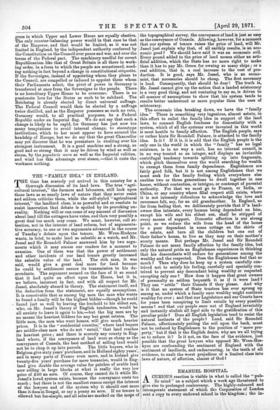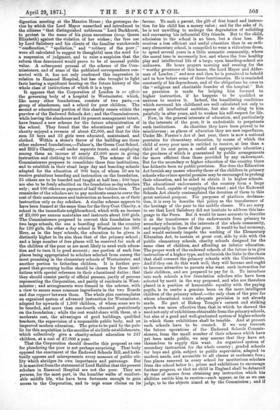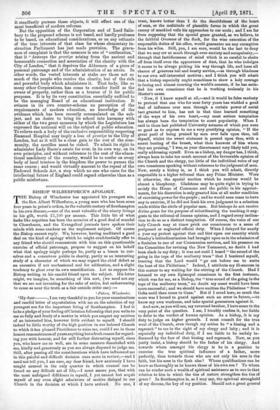EMANUEL HOSPITAL.
Ili CURIOUS reaction is visible in what is called the "pub- lic mind" on a subject which a week ago threatened to give rise to prolonged controversy. The highly-coloured and intemperate statement of which ths Corporation of London sent a copy to every endowed school in the kingdom ; the in-
dignation meeting at the Mansion House ; the grotesque de- vice by which the Lord Mayor unearthed and introduced to the citizens "that distinguished nobleman" Lord Buckhurst, to protest in the name of his pious ancestress (temp. Queen Elizabeth) against the 'violation of her wishes ; the free use by Lord Salisbury and his clients of the familiar watchwords "confiscation," "spoliation," and "robbery of the poor ;" were all calculated to suggest to thoughtful men the need for a suspension of judgment, and to raise a suspicion that the reform thus denounced would prove to be of unusual public value. A subsequent perusal of the scheme of the Com- missioners, and of some of the published correspondence con- nected with it, has not only confirmed this impression in relation to Emanuel Hospital, but has also brought to light facts having a significant bearing on the future history of the whole class of institutions of which it is a type.
It appears that the Corporation of London is ex officio the governing body of a hospital in Westminster, which, like many other foundations, consists of two parts,—a group of almshouses, and a school for poor children. The second or educational portion of this charity comes within the purview of the Endowed Schools Act ; and the Commissioners, while leaving the almshouse and its present management intact, have framed a new scheme for the future administration of the school. They found that the educational part of the charity enjoyed a revenue of about £2,000, and that for this sum 32 boys and 32 girls were educated, maintained, and clothed. Within a stone's throw of the building are three other endowed foundations,—Palmer's, the Green Coat School, and Hill's Charity,—all under separate trusts, and employing among them an income of nearly £2,000 more in giving instruction and clothing to 60 children. The scheme of the Commissioners proposes to consolidate these four institutions, and to establish in their stead large day and boarding schools adapted for the education of 900 boys, of whom 50 are to receive gratuitous boarding and instruction on the foundation, 25 others are to be boarded and taught at half fees ; 100 boys are also to be freely admitted on the foundation as day scholars only ; and 100 others on payment of half the tuition fees. The remainder of the scholars are to pay moderate sums to cover the cost of their maintenance and instruction as boarders, or of their instruction only as day scholars. A similar scheme appears to have been framed at the same time for the Grey Coat Charity, a school in the immediate neighbourhood, which with an income of £3,000 per annum maintains and instructs about 100 girls. The Commissioners proposed to convert this foundation into two large schools, the one a boarding school in the country for 120 girls, the other a day school in Westminster for 300. Here, as in the boys' schools, the education to be given is distinctly higher in its aim than that of the primary school ; and a large number of free places will be reserved for such of the children of the poor as are most likely to need such educa- tion and to turn it to good account ; one portion of such free places being appropriated to scholars selected from among the most promising in the elementary schools of Westminster, and another portion to fatherless children. It is further pro- posed that governing bodies should be chosen for these insti- tutions with special reference to their educational duties ; that they should consist partly of official persons, partly of persons representing the Corporation, and partly of residents in West- minster; and arrangements were framed in the scheme, with a view to secure some common ingredients in the two Boards and due rapport between them. The whole plan contemplates an organized system of advanced instruction for Westminster, adapted for upwards of 1,300 children, of whom some are to be boarded, and more than one-fourth educated gratuitously on the foundation ; while the rest would share with them, at a moderate cost, the advantages of good buildings, qualified teachers, the supervision of a responsible public body, and an improved modern education. The price to be paid by the pub- lic for this acquisition is the sacrifice of sixlittle establishments, which collectively give a charity-school education to 247 children, at a cost of £7,000 a year.
That the Corporation should describe this proposal as one for plundering the poor is not perhaps surprising. That body opposed the enactment of the Endowed Schools Bill, and habi- tually opposes and misrepresents every measure of public uti- lity which abridges its own importance and patronage. But it is manifest from the statement of Lord Halifax that the present scholars in Emanuel Hospital are not the poor. They are persons, for the most part, in the humbler walks of comfort- able middle life, who have been fortunate enough to gain access to the Corporation, and to urge some claims on its favour. To such a parent, the gift of free board and instruc- tion for his child has a money value ; and for the sake of it, he is not unwilling to undergo the degradation of soliciting and canvassing his influential City friends. But to the child, admission to the school is no boon, but a clear loss. He receives a less efficient and useful education than in an ordi- nary elementary school, is compelled to wear a ridiculous dress, to spend several years in a little monastic community, where the moral tone is necessarily low, and where the free healthy play and intellectual life of a large, open boarding-school are unknown. He hears prayers morning and evening for the "worthy governors of this house, the Lord Mayor and Alder- men of London ;" and now and then he is permitted to behold and to bow before some of those functionaries. He is reminded constantly of his dependence, and of the obligations he owes to the "religious and charitable founder of the hospital." But no provision is made for helping him forward to higher instruction, if he happens to be qualified or anxious to receive it. Indeed, the humiliating conditions which surround his childhood are well calculated not only to repress all intellectual ambition, but also to cling to him painfully in after years, and to weaken his self-respect for life. Now, in the general interests of education, and particularly in the interests of the poor, it is undesirable to perpetuate such institutions. As charities they have been proved to be mischievous ; as places of education they are now superfluous. Under Mr. Forster's Act of last year, there is now a national provision for elementary education, by means of which the child of every poor man is entitled to receive, at less than a third of its cost price, a useful and appropriate education ; the goodness of which is guaranteed by public arrangements far more efficient than those provided by any endowment. But for the secondary or higher education of the country there has hitherto been no public provision. Nor does the Education Act furnish any means whereby those of the children in primary schools who evince special promise may be encouraged to prolong their education, and be aided to obtain it in higher schools. The educational endowments of the country form a large public fund, capable of supplying this want ; and the Endowed Schools Act clearly contemplated the devotion of them to this great national purpose. For purposes of platform declama- tion, it is easy to describe this policy as the transference of the heritage of the poor to the middle classes. We are sorry to see that Lord Salisbury did not hesitate to address this lan- guage to the Peers. But it would be more accurate to describe it as the transference of the endowments from primary to secondary education, in the interests of the whole community, and especially in those of the poor. It would be bad economy, and would seriously impede the working of the Elementary Education Act, to sustain at great cost, side by side with the public elementary schools, charity schools designed for the same class of children, and affording an inferior education. The proper work of the endowed schools of the future is to give instruction of a higher type, and to furnish the links in the chain that shall connect the primary schools with the Universities. And if they can do this work well, they will become and ought to become attractive to parents who want such instruction for their children, and are prepared to pay for it. To introduce into such schools a few foundation scholars who have been selected by merit in the way proposed, and who are therefore placed in a position of honourable equality with the paying pupils, is to confer a genuine boon on the more intelligent children of the primary school,—the only class of the poor for whose educational wants adequate provision is not already made. No part of Bishop Temple's earnest and striking speech was more effective than that in which he showed the need not only of exhibitions obtainable from the primary schools, but also of a good and well-graduated system of higher schools in which those exhibitions shall be tenable. And at present such schools have to be created. If we may forecast the future operations of the Endowed Schools Commis- sioners, from the small number of their schemes which have yet been made public, we may assume that they have set themselves to supply this want. An organized system of secondary instruction for the whole country ; graded schools for boys and girls, subject to public supervision, adapted to modern needs, and accessible to all classes at moderate fees ; free places reserved in every school for meritorious scholars from the school below it ; prizes and exhibitions to encourage further progress, so that no child in England shall be debarred by want of means from obtaining any instruction which his abilities entitle him to receive—such appear, as far as we can judge, to be the objects aimed at by the Commission ; and if it steadfastly pursues those objects, it will effect one of the most beneficent of modern reforms.
But the opposition of the Corporation and of Lord Salis- bury to the proposed scheme is not based, and hardly professes to be based, on educational considerations, or on any estimate of the true interests of that class for whose elementary in- struction Parliament has just made provision. The grava- men of complaint is that the measure is one of "confiscation," that it "destroys the prestige arising from the ancient and honourable connection and association of the charity with the City of London," that it deprives the Aldermen of a piece of personal patronage and of the administration of an estate. In other words, the vested interests at stake are those not so much of the people who receive the charity, but of the rich and powerful body which administers it. That body, like so many other Corporations, has come to consider itself as the owner of property, rather than as a trustee of it for public purposes. It is by its very constitution essentially unfitted to be the managing Board of an educational institution. It evinces in its own counter-scheme no perception of the requirements of modern education, no knowledge of the evidence which has been recently accumulated on the sub- ject, and no desire to bring its school into harmony with either of the two great measures by which the Legislature has expressed the national will on the subject of public education. To relieve such a body of the exclusive responsibility respecting Emanuel Hospital may imply a loss of prestige to the City of London, but as it will be a clear gain to the rest of the com- munity, the sacrifice must be risked. To admit its right to administer Lady Daere's estate for ever, in its own way, on its own principles, and without reference to the rest of the educa- tional machinery of the country, would be to confer on every body of local trustees in the kingdom the power to pursue the same course ; and would virtually amount to the repeal of the Endowed Schools Act, a step which no one who cares for the intellectual future of England could regard otherwise than as a public misfortune.




































 Previous page
Previous page